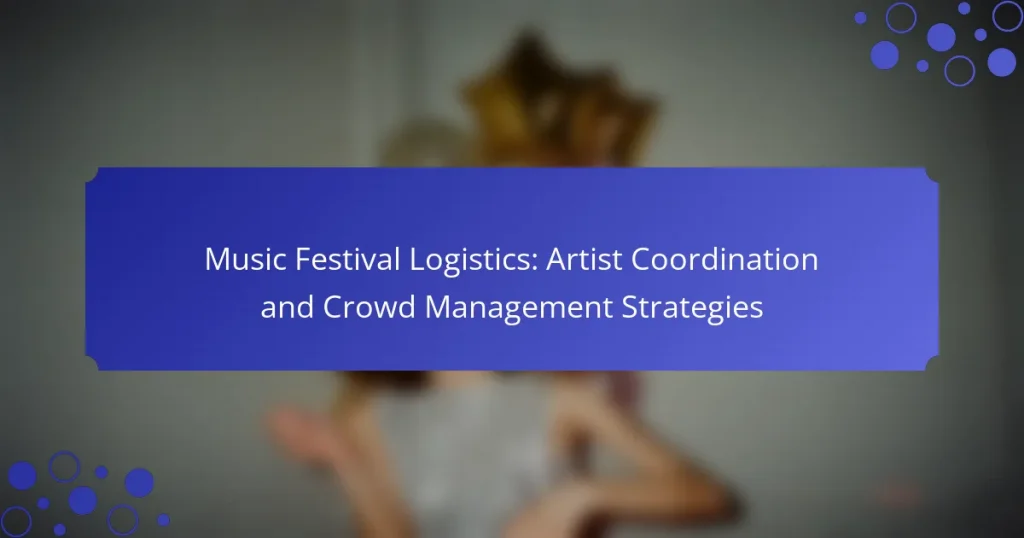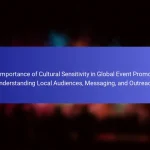Music festival logistics encompass critical components such as site planning, artist coordination, crowd management, and vendor management. Effective logistics are essential for ensuring smooth operations and enhancing the overall experience for both artists and attendees. Key aspects include the selection and preparation of festival locations, scheduling and technical management for artists, and strategies for maintaining safety and order among crowds. Recent trends highlight the increasing use of technology, sustainability initiatives, and advanced crowd management techniques, which collectively aim to improve efficiency and attendee satisfaction at music festivals.
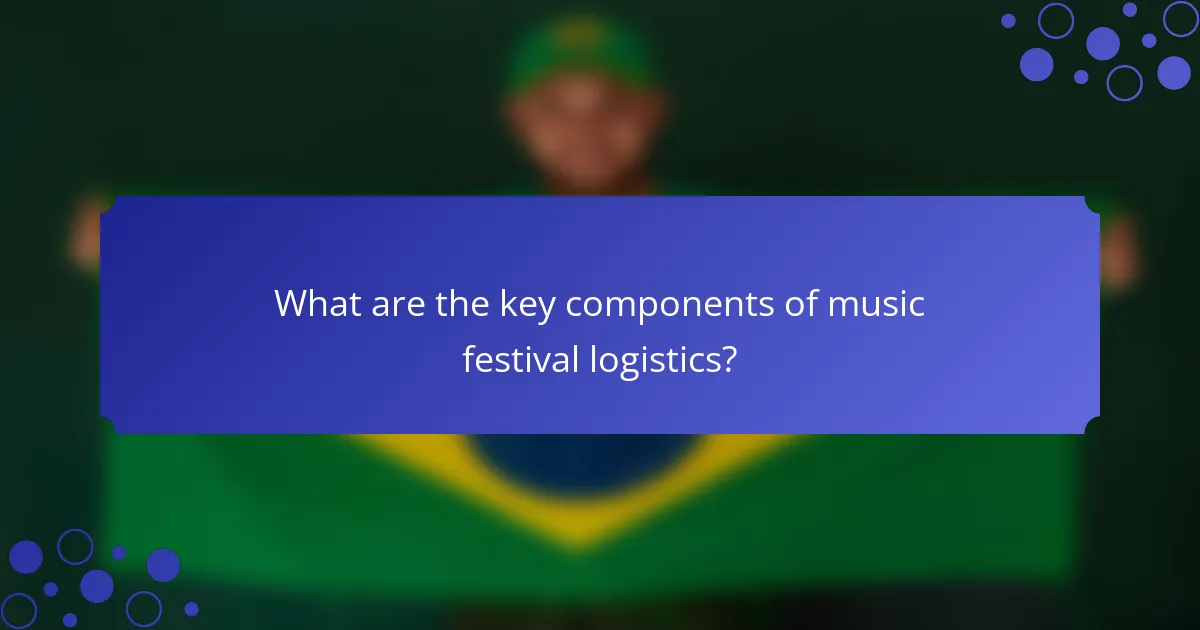
What are the key components of music festival logistics?
The key components of music festival logistics include site planning, artist coordination, crowd management, and vendor management. Site planning involves selecting and preparing the festival location, ensuring accessibility and safety. Artist coordination encompasses scheduling performances, managing technical requirements, and facilitating artist accommodations. Crowd management focuses on ensuring attendee safety, controlling access points, and maintaining order during the event. Vendor management involves organizing food, merchandise, and services available to attendees. Each component is essential for a successful music festival, as they collectively ensure a smooth experience for artists and attendees alike.
How does artist coordination play a role in music festival logistics?
Artist coordination is crucial for music festival logistics. It ensures that artists’ schedules align with festival timelines. This coordination facilitates smooth transitions between performances. Effective communication with artists helps manage their technical and hospitality needs. It also allows for proper stage setup and sound checks. Additionally, artist coordination contributes to crowd management strategies. By scheduling performances strategically, it minimizes overcrowding at stages. This enhances the audience experience and maintains safety. Overall, artist coordination is integral for operational efficiency in music festivals.
What are the essential elements of artist coordination?
The essential elements of artist coordination include communication, scheduling, logistics, and artist relations. Effective communication ensures all parties are informed and aligned. Scheduling involves coordinating performance times and rehearsals. Logistics covers transportation, accommodations, and equipment needs. Artist relations focus on maintaining positive interactions and addressing artists’ requirements. These elements are crucial for smooth operations and successful events.
How do artist schedules impact festival logistics?
Artist schedules significantly impact festival logistics by dictating performance times and resource allocation. These schedules determine when artists arrive, rehearse, and perform. Each artist’s requirements, such as soundchecks and equipment needs, must be coordinated accordingly. For example, overlapping performance times can lead to logistical challenges with stage transitions. Additionally, artist availability affects the scheduling of support staff and technical crews. Festivals often require precise timing to ensure smooth operations and audience satisfaction. A well-structured artist schedule can enhance the overall flow of the event. Conversely, poorly managed schedules can result in delays and confusion. Thus, effective artist scheduling is crucial for successful festival logistics.
What strategies are used for effective crowd management?
Effective crowd management strategies include planning, communication, and monitoring. Proper planning involves assessing venue capacity and designing crowd flow patterns. Communication is essential; clear signage and announcements guide attendees. Training staff to manage crowds ensures safety and efficiency. Monitoring crowd density helps to prevent overcrowding. Utilizing technology, like surveillance cameras and crowd management software, enhances real-time decision-making. Historical data shows that well-executed crowd management reduces incidents at large events. For instance, the 2019 Coachella Festival implemented these strategies, resulting in a safer environment for over 100,000 attendees.
What are the best practices for ensuring crowd safety?
The best practices for ensuring crowd safety include effective planning, crowd management, and communication. First, event organizers should conduct a thorough risk assessment before the event. This assessment identifies potential hazards and outlines strategies to mitigate them. Second, proper crowd control measures should be implemented. This includes designing clear pathways and ensuring adequate space for movement. Third, trained security personnel should be present to monitor the crowd and respond to emergencies. Studies indicate that events with well-trained staff experience fewer incidents. Fourth, clear communication channels must be established. This allows for timely updates and instructions to be relayed to attendees. Lastly, emergency response plans should be in place and rehearsed. This preparation ensures quick action during incidents, enhancing overall safety.
How can technology enhance crowd management during festivals?
Technology can enhance crowd management during festivals by improving communication and real-time data analysis. Advanced systems like mobile apps can provide attendees with updates on crowd density and safety information. Drones can monitor crowd movement from above, offering insights into potential bottlenecks. Smart cameras equipped with AI can analyze crowd behavior and predict issues before they escalate. RFID wristbands can track attendee locations, enabling efficient resource allocation. Furthermore, social media platforms can serve as real-time feedback channels, allowing organizers to address concerns promptly. These technological solutions collectively improve safety and enhance the overall festival experience.
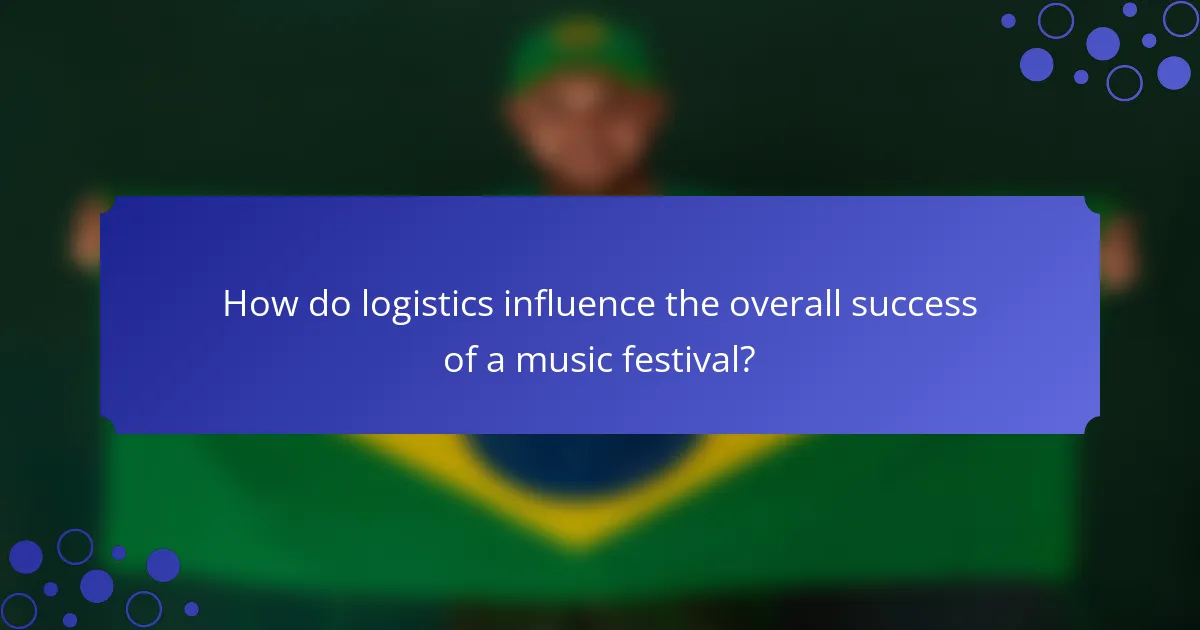
How do logistics influence the overall success of a music festival?
Logistics significantly influence the overall success of a music festival. Effective logistics ensure smooth operations, from artist coordination to crowd management. Proper planning minimizes delays and enhances the attendee experience. For instance, efficient transportation systems facilitate timely artist arrivals and equipment setup. Additionally, well-organized crowd management prevents bottlenecks and enhances safety. According to a study by Eventbrite, 70% of festival-goers prioritize organization when choosing events. Therefore, successful logistics directly impact attendee satisfaction and festival reputation.
What are the logistical challenges faced by music festivals?
Music festivals face several logistical challenges. These include site selection and preparation. Choosing an appropriate venue can impact accessibility and capacity. Weather conditions can also pose risks, affecting safety and attendance.
Additionally, managing transportation logistics is crucial. This includes coordinating artist travel and accommodating audience access. Security measures must be implemented to ensure safety for all attendees.
Staffing and volunteer management present another challenge. Recruiting and training sufficient personnel is essential for smooth operations. Lastly, waste management and sanitation facilities are necessary to maintain a clean environment.
These factors collectively influence the overall success of a music festival.
How do weather conditions affect festival logistics?
Weather conditions significantly impact festival logistics. Rain can lead to muddy grounds, affecting stage setup and audience movement. High temperatures may require additional hydration stations and shade for attendees. Wind can pose risks for structures like tents and stages. Severe weather may necessitate evacuation plans and emergency services. Historical data shows that festivals have faced cancellations or delays due to adverse weather. For example, the 2015 Coachella festival experienced high winds, leading to safety precautions. These factors highlight the need for comprehensive weather contingency plans in festival logistics.
What role do permits and regulations play in festival planning?
Permits and regulations are essential for festival planning. They ensure compliance with local laws and safety standards. Securing permits helps organizers avoid legal issues. Regulations dictate aspects like noise levels, crowd control, and health protocols. For example, many jurisdictions require permits for large gatherings to manage public safety. Compliance with fire codes is also necessary for venue safety. Additionally, permits can dictate the types of vendors allowed on-site. Overall, permits and regulations are crucial for successful and safe festival execution.
Why is communication crucial in music festival logistics?
Communication is crucial in music festival logistics because it ensures efficient coordination among teams. Clear communication facilitates timely decision-making during the event. It helps to prevent misunderstandings that could lead to logistical errors. For example, miscommunication about set times can disrupt artist performances. Effective communication channels enable real-time updates regarding crowd management. This can enhance safety and improve the overall experience for attendees. Studies show that well-communicated logistics can reduce operational delays by up to 30%. Therefore, strong communication is foundational for successful festival execution.
What tools can be used for effective communication among teams?
Effective communication among teams can be achieved using various tools. Project management software like Trello or Asana helps organize tasks and deadlines. Messaging platforms such as Slack or Microsoft Teams facilitate instant communication. Video conferencing tools like Zoom support remote meetings and discussions. File-sharing services like Google Drive or Dropbox enable collaborative document editing. These tools enhance coordination and information flow among team members. Studies show that using these tools can increase productivity by up to 25%.
How can clear communication improve artist and crowd experiences?
Clear communication enhances artist and crowd experiences by ensuring expectations are met. Artists receive accurate information about schedules, set times, and technical requirements. This clarity reduces stress and allows artists to focus on performance quality. For the crowd, clear communication about event details improves attendance and engagement. It includes information on entry procedures, setlists, and safety protocols. Effective communication fosters a positive atmosphere, enhancing enjoyment for both artists and attendees. Research indicates that events with well-communicated logistics see higher satisfaction ratings. For example, a study by Eventbrite found that 78% of attendees appreciate clear information about events.
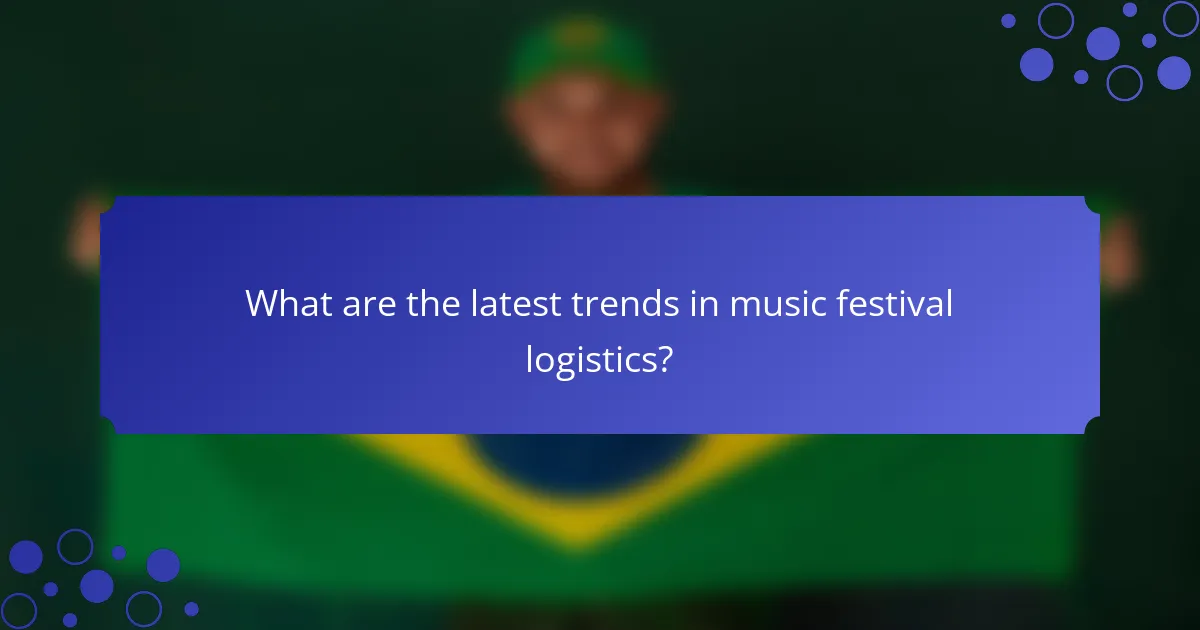
What are the latest trends in music festival logistics?
The latest trends in music festival logistics include enhanced use of technology, sustainability initiatives, and improved crowd management strategies. Technology such as mobile apps is being utilized for real-time updates and communication. RFID wristbands are increasingly used for cashless transactions and access control. Sustainability efforts focus on reducing waste and carbon footprints through eco-friendly practices. Solar power and biodegradable materials are becoming standard. Crowd management is evolving with data analytics to predict attendance patterns. Drones are being employed for aerial monitoring of crowds. These trends reflect a shift towards efficiency and environmental responsibility in festival logistics.
How is sustainability impacting festival logistics?
Sustainability is significantly impacting festival logistics by promoting eco-friendly practices. Event organizers are adopting measures to reduce waste and carbon footprints. This includes using biodegradable materials for food and beverage containers. Additionally, many festivals are implementing recycling and composting programs. Transportation logistics are also being optimized to encourage public transit and carpooling. Studies show that sustainable festivals can attract larger audiences, with 68% of attendees preferring eco-conscious events. This shift not only enhances the festival’s reputation but also fosters community engagement in sustainability efforts.
What eco-friendly practices are being adopted by festivals?
Festivals are adopting various eco-friendly practices to reduce their environmental impact. Many festivals implement waste reduction strategies, such as providing recycling and composting stations. They also promote the use of reusable containers and utensils to minimize single-use plastics. Some festivals source food and beverages from local vendors to reduce transportation emissions. Renewable energy sources, like solar panels, are increasingly utilized for power needs. Additionally, festivals often encourage public transportation and carpooling among attendees to decrease carbon footprints. Research shows that these practices can significantly lower waste and energy consumption at events. For instance, the Green Music Initiative reports that festivals adopting these measures can reduce waste by up to 80%.
How can festivals balance sustainability with crowd enjoyment?
Festivals can balance sustainability with crowd enjoyment by implementing eco-friendly practices and engaging attendees in sustainability efforts. Utilizing renewable energy sources, such as solar panels, reduces carbon footprints while powering the event. Offering reusable or biodegradable materials for food and drink minimizes waste generated during the festival.
Encouraging public transportation or carpooling helps decrease traffic congestion and emissions. Providing educational programs on sustainability fosters awareness among attendees, enhancing their experience while promoting eco-conscious behaviors.
Data from the Green Music Initiative shows that festivals adopting these practices can reduce waste by up to 70%. This approach allows for a more enjoyable and responsible festival experience, aligning entertainment with environmental stewardship.
What innovative technologies are shaping the future of festival logistics?
Innovative technologies shaping the future of festival logistics include drones, RFID tracking, and mobile applications. Drones are used for aerial surveillance and real-time monitoring of crowds. RFID tracking enhances inventory management and attendee access control. Mobile applications facilitate communication and provide real-time updates for attendees. These technologies improve safety and operational efficiency. According to a 2022 study by Eventbrite, 70% of festival organizers reported enhanced crowd management through these technologies.
How can data analytics improve artist coordination and crowd management?
Data analytics can significantly enhance artist coordination and crowd management by providing actionable insights. It enables real-time tracking of artist schedules and performance metrics. This facilitates better communication among artists, management, and event organizers. Data analytics also helps in predicting crowd behavior based on historical attendance patterns.
For example, analyzing ticket sales data can forecast peak attendance times. This allows for optimal resource allocation, such as staffing and security measures. Additionally, sentiment analysis from social media can gauge audience reactions during the event.
According to a report by Eventbrite, 76% of event organizers use data analytics to improve attendee experiences. This demonstrates the effectiveness of data-driven strategies in enhancing both artist coordination and crowd management.
What are the best practices for successful festival logistics management?
Successful festival logistics management involves meticulous planning and coordination. Establish a detailed timeline for all logistical elements. This includes scheduling setup, event operations, and breakdown. Use a centralized communication system for all teams. This ensures real-time updates and quick problem resolution. Conduct thorough site assessments before the festival. Identify potential challenges such as access routes and emergency services. Implement a crowd management plan to ensure safety. This should include clear signage and trained personnel. Regularly review and adjust logistics based on feedback and data. This approach enhances efficiency and attendee experience.
Music festival logistics encompass crucial components such as artist coordination and crowd management strategies that collectively ensure a successful event. Key aspects include site planning, scheduling performances, managing technical requirements, and ensuring attendee safety. Effective communication and the use of technology are essential for optimizing logistics, as they influence artist schedules and crowd flow. Additionally, best practices in logistics management address challenges like weather conditions, regulatory compliance, and sustainability efforts, enhancing overall attendee experience and safety.
